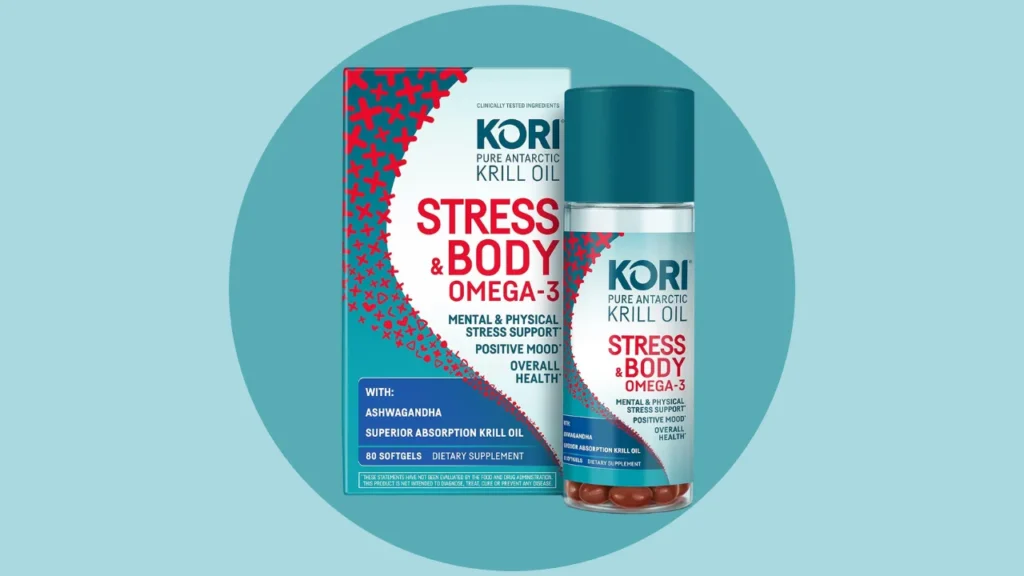Stress: In today’s fast-paced world, it’s difficult to avoid. Factors like work, family, relationships, and responsibilities may trigger your stress response. When this happens, hormones like cortisol are unleashed, adversely affecting your mind and body. Fortunately, you can take steps to fight the effects of stress and reduce hormone levels, thereby bringing you a more peaceful life. Combining Sensoril Ashwagandha with a balanced routine is one way to combat the effects of stress. In this article, we’ll explain the science behind why Sensoril Ashwagandha works, recommend some steps to combat stress and suggest a premium supplement designed to help you fight stress.
Understanding stress hormones
Cortisol and adrenaline are hormones that your body releases as stress responses to any potential threats. This “fight or flight” response is a survival mechanism that equips you for challenges. Still, chronic stress can cause you to remain in this state perpetually, constantly producing these hormones. The problem is that high cortisol levels have been associated with many health conditions, like anxiety, weight gain, and cardiovascular issues.
How to reduce stress hormones: the role of lifestyle
If you want to avoid the effects of stress, you’ll need to take a comprehensive approach, focusing on both your mind and body. Staying active, getting enough sleep, and practicing mindfulness with practices like meditation are proven to help lower stress hormones. A healthy, nutrient-rich diet can also prepare your body to fight stress.
You May Also Like:
ONNIT Supplements Antarctic Krill Oil Reviewed: A Leading Memory Support Supplement
How to reduce stress hormones: the power of Sensoril Ashwagandha as an adaptogen
On the journey to lowering stress, natural remedies have gained favor for their ability to alleviate stress symptoms without the side effects of prescription medications. Sensoril Ashwagandha is one such remedy. An adaptogen sourced from the Withania somnifera plant, Ashwagandha has been used since ancient times for restoring balance and relieving chronic stress.
Understanding Adaptogens
Adaptogens are botanical compounds that can help your body adapt to stress and return to homeostasis. Unlike typical methods of stress relief that mainly focus on alleviating particular symptoms or targeting isolated areas of the body, adaptogens bring a holistic solution for managing stress. They regulate the body’s stress response by engaging various systems to balance bodily functions and enhance overall health.
The Rich History of Ashwagandha
Ashwagandha (Withania somnifera) is an herb praised in Ayurvedic medicine, one of the world’s oldest medical systems originating in India. Ayurveda takes a comprehensive approach to healing. Ashwagandha has been used for thousands of years to enhance vitality, fortify immunity, and fight the impact of stress. Its name comes from Sanskrit; “ashva” means “horse,” and “gandha” means “smell,” indicating the herb’s unique aroma and highlighting its ability to provide the strength and energy of a horse.
Sensoril Ashwagandha: A Modern Marvel
Sensoril Ashwagandha is a modernized form of Ashwagandha that is eight times stronger than the original. This extract is patented and standardized, with a proprietary ratio of active compounds from the roots and leaves of the Ashwagandha plant. This specialized formula provides a consistently effective and potent product, making it a trustworthy source for anyone wanting to obtain the stress-relieving benefits associated with Ashwagandha.
Reducing Cortisol Levels
One way that Sensoril Ashwagandha provides stress relief is by regulating cortisol levels. Cortisol, also called the “stress hormone,” is actively involved in the body’s response to stress. While cortisol is needed for survival and maintaining equilibrium, chronically high levels can potentially harm your health. Sensoril Ashwagandha is proven to help regulate the amount of cortisol your body produces, promoting balance in your body and preventing cortisol overproduction.
Enhancing Resilience and Mood
Sensoril Ashwagandha may also help improve your emotional well-being. Research has demonstrated that the adaptogen can promote a positive mood, calm anxiety, and enhance emotional resilience. By regulating neurotransmitters like GABA, serotonin, and dopamine, Sensoril Ashwagandha promotes relaxation and may help improve coping skills. This powerhouse ingredient may help you maintain calm while facing everyday struggles.
Promoting Cognitive Function
Stress can be detrimental to cognitive function, leaving you with impaired concentration, memory, and decision-making. Sensoril Ashwagandha’s potential for improving cognition makes it valuable for those focused on improving their mental clarity and focus. Studies have shown that Ashwagandha may enhance cognitive function by supporting healthy brain activity and neutralizing the adverse cognitive effects of chronic stress.
A Gentle Approach to Relaxation
Sensoril Ashwagandha is unique from prescription medications because it doesn’t make you drowsy. It promotes calm and balance while allowing you to stay alert. This benefit particularly appeals to those who want stress relief without sacrificing productivity during the day.
Incorporating Sensoril Ashwagandha
Integrating Sensoril Ashwagandha into your daily regimen is a simple and accessible way to reap the stress-relieving benefits of this potent herb. You can find it in various forms, such as capsules, powders, and tinctures, making it great for many lifestyles. However, as with any supplement, consulting your doctor before trying it is advisable to avoid potential medication interactions or conflicts with any current health conditions.

How to reduce stress hormones: the role of social support
Social connections play a crucial role in both stress management and overall health. Your bonds with family, friends, and communities can impact how you approach challenges, cope with stress, and your capacity to find comfort when faced with hardships. Understanding the significance of social support on your journey to fight stress is crucial for developing a comprehensive approach to dealing with daily stressors.
The Social Network Effect
Humans are hardwired to be social creatures, seeking connection and acceptance. Your relationships with others nurture your emotional needs, sense of purpose, and sense of security. This web of relationships constitutes your social network, spanning your close connections to your community ties. Research has underscored the significance of social networks in bolstering one’s resilience against stress and contributing to overall mental health.
Emotional and Practical Support
Social support can appear in many ways, from comfort to practical assistance. Comfort includes expressing empathy, understanding, or validation. Having someone to talk to, relate to, and receive encouragement from can help lighten the emotional impact of stress. Practical assistance involves tangible help, including assistance with daily tasks, childcare, or finances. Both types of support can contribute to the sense of being cared for and valued, helping create a support system that promotes resilience.
Stress Buffering Mechanism
Social support can help with stress resilience because it is a buffering mechanism. Whether facing significant or minor stressors, having a supportive network can help cushion the blow of stress. Social support can help you reframe your perspective, deal with emotional responses, and solve problems better. Knowing you’re not alone can help you avoid feeling isolated or vulnerable.
Physiological Impact
Social support helps more than just your mental health—it also significantly impacts physiological functioning. Studies have shown that people with solid social networks have lower stress hormone levels when responding to stress. Social support tends to cushion the blow of stress on the body, leaving less damage to body systems. Additionally, social interactions may trigger your body to release oxytocin, known as the “bonding hormone,” which promotes trust, empathy, and connection.
The Role of Community
A sense of community strongly affects stress resilience. Joining a community or group with similar beliefs or interests brings a broader scope of support. Community involvement allows you to socialize, engage in activities, and be part of a larger purpose. Whether within religious communities, fan groups, hobby clubs, volunteer organizations, or online communities, participation in a more extensive network helps promote feelings of belonging and contributes to your overall wellness.

How to reduce stress hormones: cultivating strong connections
Building quality relationships requires effort and deliberateness. Here are some ways you can make meaningful social connections and benefit from the stress-fighting power of social support:
1. Prioritize Communication: Check on your friends, family, and loved ones. Honest communication deepens your connections with others, allowing both parties to express their thoughts and emotions.
2. Seek Mutual Support: Finding accountability partners who provide support and empathy can bring mutual benefits to your lives. The act of returning support can be equally beneficial.
3. Foster Empathy: Learning to look at things from other people’s perspectives can help you understand and relate to them. Empathy makes emotional bonds stronger and improves your interactions with others.
4. Engage in Shared Activities: Try engaging in activities that involve social interaction. Shared experiences deepen bonds and help create collective memories.
5. Build Resilient Communities: Help develop supportive communities by organizing events, workshops, and gatherings, as these initiatives can help promote connection and overall well-being.
How to reduce stress hormones: Embrace a holistic lifestyle
Sensoril Ashwagandha can offer benefits for relieving stress. However, developing a holistic lifestyle is essential if you’re looking for long-term change. Ensuring you get daily exercise, practice mindfulness, and eat a wholesome diet are all important assets for managing stress.
How to reduce stress hormones: Stress & Body Ashwagandha + Omega-3 by Kori Krill Oil
The search for natural solutions for alleviating stress has birthed synergistic combinations that benefit your overall health. A premium supplement that does just this is Stress & Body Ashwagandha + Omega-3 by Kori Krill Oil. This unique combination of Ashwagandha and the omega-3s in krill oil has gained attention for its potential to combat the effects of stress on both the mind and body.
The Ashwagandha Advantage
Ashwagandha has gained recognition for its neutralizing effects on stress. This powerful herb is an adaptogen that helps your body cope with the physiological effects of stress. Ashwagandha contains withanolides, which are thought to regulate cortisol levels, thus allowing your body to respond effectively to stress. This potent herb can help encourage a balanced mood and increase stress resilience. Kori Krill Oil’s Stress & Body Ashwagandha + Omega-3 contains Sensoril Ashwagandha, a powerful and proven source for receiving the benefits of Ashwagandha.
Omega-3’s Cognitive Calm
Omega-3s are best known for their heart and brain health benefits. These fatty acids are often found in fatty fish and supplements. Research has shown that both EPA (eicosapentaenoic acid) and DHA (docosahexaenoic acid) help reduce inflammation and promote brain health. Omega-3s can also help improve mood by modulating neurotransmitter pathways involved in stress and depression.
Kori Krill Oil: A Unique Omega-3 Source
Kori Krill Oil, deriving its powerful source of EPA and DHA from tiny crustaceans known as krill, contributes to the synergy of Ashwagandha and omega-3. Krill oil stands out from fish oil sources because it is in phospholipid form, meaning your body more easily absorbs it as the omega-3s are delivered directly into cell membranes. Due to this bioavailability, you can be sure your body makes the most of its omega-3s.
A Comprehensive Approach to Stress Management
Stress & Body Ashwagandha + Omega-3’s blend offers a comprehensive approach to combating stress. Ashwagandha modulates the stress response in the body and encourages emotional balance, while omega-3s promote cognitive health and mood regulation. Including krill oil enhances the absorption of omega-3s within the body, boosting their potential benefits.

How to reduce stress hormones: Take the first step
When it comes to answering the question of how to reduce stress hormones, you must be intentional about reaching a calm state; this requires commitment and healthy lifestyle changes. By adding Sensoril Ashwagandha to your routine and practicing stress-reducing techniques, you are taking the first step toward attaining a peaceful, balanced life. Like all natural remedies, individual results may vary. For this reason, you should consult your doctor to see if Ashwagandha with omega-3 is right for you. Practicing stress-reducing techniques can also help you lead a calmer, more centered life. With perseverance and diligence, it is possible to lead a less stressful life, enhancing your vitality and fostering a healthier future.

Additional reading:
Harvard Health: Bouncing back from stress
Mayo Clinic: Chronic stress puts your health at risk
American Psychological Association: Stress Tip Sheet
National Library of Medicine: The Effect of Mindfulness-Based Therapy on Anxiety and Depression: A Meta-Analytic Review
Important Note: The information contained in this article is for general informational purposes only, and should not be construed as health or medical advice, nor is it intended to diagnose, prevent, treat, or cure any disease or health condition. Before embarking on any diet, fitness regimen, or program of nutritional supplementation, it is advisable to consult your healthcare professional in order to determine its safety and probable efficacy in terms of your individual state of health.
Regarding Nutritional Supplements Or Other Non-Prescription Health Products: If any nutritional supplements or other non-prescription health products are mentioned in the foregoing article, any claims or statements made about them have not been evaluated by the U.S. Food and Drug Administration, and such nutritional supplements or other health products are not intended to diagnose, treat, cure, or prevent any disease.


